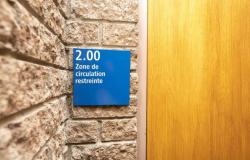In Quebec, the only French-speaking state in America, debates on the subject are desperately polarized.
From the slightest report, we insist on “figures” and “indicators” while French, especially in the large metropolitan region, continues to lose weight.
Ditto for recent data from the Office québécois de la langue française on language in businesses. On the island of Montreal, since 2010, the use of “Bonjour-Hi” has increased from 4% to 12%. Reception in French slipped from 84% to 71%. The one in English only rose from 12% to 17%.
Nearly 97% of customers were nevertheless able to be served in French. Result: some only see the decline of French at reception. Others only see its stability in service.
The reality, however, is more nuanced. Compared to English, the decline of French as a host language in fact betrays the weakening of its balance of power as a common language. Result: his social status crumbles.
In other large Canadian cities, there is no “Bonjour-Hi” in businesses. Only the “Hi”. Because everyone knows that English, de facto, is the common language.
In Montreal, it is good news that customers are served in French. The bad news is that once greeted in English or “bilingual”, they must ask to be served in French.
Objective not achieved
Let us remember that Law 101 is nevertheless based on the explicit objective of making French the “normal and usual” language of work, education, communications, commerce and business.
However, in the Montreal region, the words “normal and usual” apply less and less. Beyond the usual hair-raising over the figures or the blame thrown at immigrants, the heart of the problem is there.
Memory being a faculty that forgets, let us recall what happened long before the recent increases in the immigration rate.
Between 1996 and the adoption in 2022 of the Act respecting the official and common language of Quebec, faced with the decline of French that had already begun, successive majority Quebec governments chose to do nothing.
As early as 1996, yellow lights were already lighting up. A specialist in linguistic issues, I was the director of the first assessment of the situation of the French language since the adoption of Law 101. Our team was mandated in 1995 by Prime Minister Jacques Parizeau.
Is it too late?
Over the course of our work, certain declines in French have appeared in the language of signage and reception, workplaces and public administration.
We also discovered that more and more allophones educated in French at primary and secondary level nevertheless chose English for their higher education.
The Bouchard government and the media, however, described our findings as “alarmist.” There is no point, according to them, in strengthening Law 101. This was a major historical error. Since then, a quarter of a century of apathy has had its price.
And we will be surprised that the younger generations, raised in this too long vacuum on the linguistic front, find English cooler – and French out of date – even in the corridors of French-speaking schools.
As for the tightening of Bill 101 by the CAQ, it has the merit of existing. Most experts, however, conclude that he is too shy. Including his refusal to extend Law 101 to CEGEPs.
The question is inevitable. To ensure in the long term that French is as “normal and usual” a language here as English outside Quebec, would it already be too late? We wish this wasn’t the case…






